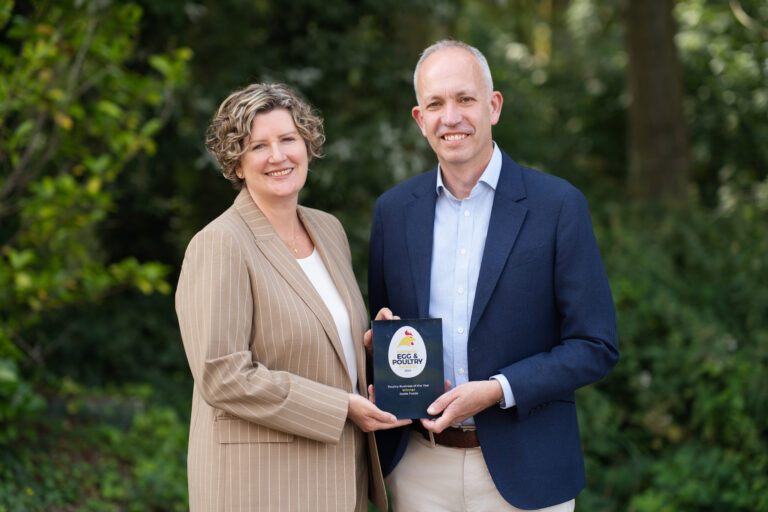Poultry Business of the Year Noble Foods has set out its stall as a market leader with a soul, as chair Sarah Dean tells Michael Barker
When you’re the biggest player in any given field, it would be easy to rest on your laurels and allow smaller, hungrier competitors to get ahead.
But if that’s the case, then nobody has told Noble Foods. Britain’s largest egg supplier has put a laser focus on improving every aspect of its business in recent times, ranging from boosting its social and sustainability credentials to innovating on production, marketing and new product development. The depth of its work led to the company picking up the coveted Poultry Business of the Year gong at the 2024 National Egg & Poultry Awards, in addition to a number of individual awards for its employees. More recently, Noble won the ‘Leading with Purpose’ Award at the Business Culture Awards in what has been a year rich in recognition for the business.
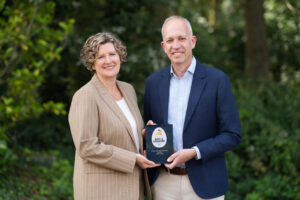
When Sarah Dean bought Noble Foods back into her family’s hands in 2019 and subsequently took over as chair, it’s probably fair to say she wouldn’t have anticipated the scale of challenges that her business and the wider industry were about to come up against. A global pandemic, soaring production costs, margin pressure, a consumer cost-of-living crisis and the worst-ever outbreak of avian flu all made it a time that meant good management was more critical than ever.
Despite all those headwinds, what immediately strikes you from talking to Dean is her upbeat positivity – a glass-half-full attitude that has no doubt served the business well through such a tumultuous time. So how would she summarise that extraordinary period? “I use the word transformational, both for me and the business,” she says. “We can all recognise it’s been an incredible rollercoaster of a journey.”
Building the board
That journey has included some pretty significant changes, both in personnel and strategic decision making. One of most critical was the hiring of former Kerry Foods boss Duncan Everett as chief executive in 2020, upon whom Dean lavishes particular praise. “If you don’t have people who are aligned to your vision and share your values, then actually you really can’t achieve anything,” she points out.
Today’s revamped board also features former Co-op CEO Steve Murrells, growth strategist Anwar Sultan and food writer and communications expert Mallika Basu as non-executive directors, with the latter two recent appointments adding diversity and fresh perspectives to what is a highly experienced business group. “When you have two legends like Steve and Duncan around the table, I don’t need any more what you might call mainstream commercial heavy hitters,” Dean explains. “They’re amazing. And just by having two other voices in the room, it allows a different perspective. It allows greater conversation and different types of thinking, which I feel is to the benefit of the company.”
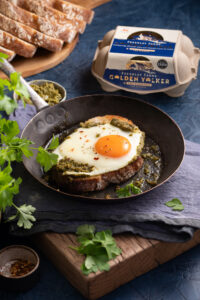
Teamwork is at the heart of Dean’s philosophy, and throughout our conversation she praises the work and dynamism of her colleagues and the desire to empower them to fulfil their potential. She even admits that she was emotional at a recent company conference over a touching video about Noble Foods today put together by Everett and HR director Louisa Hogarty, showing a willingness to be vulnerable that should also be seen as a strength.
That sense of empathy with others was most highlighted when Noble took the difficult decision to close down the Standlake packing plant in 2022, with the loss of 128 jobs. The company supported all the workers by giving them interview coaching and helping with CV writing, to the extent that when the plant finally closed every person had a new job to go to. “We did everything with integrity and compassion as we care about people,” Dean recalls.
The Standlake closure was just one of a number of tough steps the management had to take to put the company on the right footing. That included selling the Gü desserts business in 2021 – which Dean says didn’t logically fit with Noble’s other operations – in a move that allowed the company to pay down debt and strengthen its financial position.
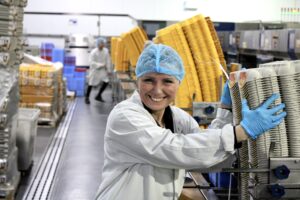
Financially, Dean stresses the business is on a stable footing, performing well and with the firepower to invest and grow – something which she and Everett are particularly excited about. Sharing the success is also important to Dean, which is why the ‘People Partnership’ was launched in 2020, with this the fourth year that the reward scheme will acknowledge everyone’s dedication by sharing the proceeds with a financial bonus.
Hitting the accelerator
Having spent the first few years of Dean’s return being “reactionary”, in her words, Noble is now looking to build by proactively taking control of its own destiny. In 2022 it acquired organic feed specialist Hi Peak Feeds, allowing it to increase feed capacity without the cost of building a plant from scratch. It has since boosted capacity by upgrading equipment and buying bigger presses and more storage bins, which combined has raised feed production to 900,000t a year. Describing Noble as not just a big egg business, but a big animal feed business as well, Dean cites a surprising statistic that only around 20% of the company’s feed output goes into the eggs it packs, with the rest sold commercially with a focus on quality and service.
The benefit of that work is to offer total traceability throughout Noble’s operations, Dean explains. “It means we know where our food comes from and can be very reactive with feed as well,” she says. “It also enables us to trial things that other people wouldn’t be able to, and be ahead of the game”. By way of example, Noble removed 42% of the carbon footprint of an egg line by removing soya from the diet using a method created in-house, while it separately ran a successful Alltech EnviroPack trial which targeted environmental issues, but has also been shown to boost efficiency and egg quality. The product is now part of the Noble feed offering to producers. Dean stresses Noble wants to lead on science-based hen welfare, and is also running initiatives including trialling non-beak-tipped flocks as well as investigating AI technology to understand birds better.
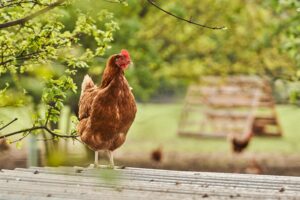
Investing in the producer base was another high priority for Dean after she bought back the business, despite not everyone believing the spend made sense at that time: “I just thought we needed to pay them fairly for all they do. Our business only works if our farmer partners’ businesses work.”
Part of the company’s offer to its producers is enabling them to fix their prices if they commit to forward-buying Noble’s feed – a fact that paid off handsomely for those who signed up just before the Ukraine conflict. This year, there’s been something of a bidding war for supplies as customers compete for eggs, but Noble believes its overall package to producers is compelling enough that it doesn’t have to get involved in a messy auction. “I know sometimes producers are being quoted more competitively elsewhere,” Dean states. “And we said we shouldn’t go higher. I back my team, and they’ve done the best price they can. I think we offer lots of other things and there are some silly and unsustainable prices out there. You have to question how people are going to pay for those eggs. We are just about in balance at the moment in the UK, but I think we are going to come back into a challenging market, especially with AI rearing its head again. There are some really rich contracts out there and I get why producers would go for it, but we’ve got 250 family farms and I believe most of them value all the other things we can bring. I want to make sure that producers are sustainable.”
Those added-value elements include the way that Noble is able to work closely with its producers, building relationships, helping raise performance levels, sharing best practice and supporting them in difficult times, all while offering competitively priced finance with an opportunity to fix at 6% for scheme members, and a market-leading AI insurance.
Investment in the producer base is naturally a central part of the company’s spend, but that hasn’t come at the expense of investment in physical infrastructure. This year the firm has spent £8-10m on a new added-value manufacturing site in Leicester, giving it the opportunity to expand its Consumer Foods portfolio beyond traditional shell eggs. Output from the site is aimed at the Quick Service Restaurant (QSR) and wholesale markets, with foods including omelettes, egg bites and frittatas all on the menu. “We want things that are going to compete with sandwiches in the snacking sector or in school lunches,” Dean says. “At the moment we are just doing simple frozen omelettes, but longer term we have great ambition, which starts with the launch of plain and cheese Happy Egg Omelettes in Morrisons in the New Year.”
The road to B Corp
Ambition certainly seems to be in unlimited supply right now. Dean describes herself as “an entrepreneur at heart”, and part of that means being a risk taker and trying new things. She is an advocate for the potential of insects in animal feed and has invested personally in a black soldier fly business, not just out of altruism or to pursue an emergent technology, but she believes that the price for sustainable soya will rise and ultimately make insects an affordable commercial alternative.
It all ties into a wide sustainability drive that is touching every aspect of the business. The company has been blazing a trail as one of the first to do what is known as green-linked finance with a banking syndicate that includes Lloyds Bank, Rabobank and NatWest. The scheme involves Noble’s new debt facilities being sustainability linked and incorporating targets around carbon reduction, apprenticeships and biodiversity – and crucially, interest costs rise or fall depending on the extent to which these targets are met. It is also in the process of working towards B Corp status, which Noble believes would make it the largest business in agriculture to achieve that certification. On the agenda for 2025 is deeper engagement with the supply chain and further advancing the commitment to diversity, equity and inclusion.
On the environmental front, Noble recently announced that SBTi had validated its GHG-reduction targets, which include reaching net-zero emissions by 2050 or sooner and hitting numerous milestones along the way. Last year the business also participated in the Restore the River event hosted by Friends of the Wye as it looks to build relationships in an area that has become a point of controversy for the poultry industry. And in a further development, Noble shell egg has signed up to The UK Soy Manifesto, which pledges to ensure all shipments of soy are deforestation and conversion-free by no later than the end of 2025.
Social responsibility
Another of Dean’s mantras is “living with purpose” and she insists she has “a really strong moral compass” that can be seen in Noble’s charitable and social endeavours. The business works with the likes of Magic Breakfast and City Harvest, while each of its sites also has links to local community projects. In addition to supporting domestic initiatives, the company feeds 1,600 children every day in Malawi, on the back of having previously built schools in the impoverished African nation.
Dean is a passionate believer in helping other women up the career ladder, and Noble has supported the Young Women in Poultry Production initiative, as well as improving its maternity and paternity policies, and implemented special development programmes specifically targeted at women. Below new agriculture director Barney Kay, for example, is a team of six people – five of which are women. “Ultimately we want to offer everybody opportunities to learn, develop, grow and be the best person they can be,” she says. “No matter where they come from, what they do, what gender or sexuality, it’s really important for them to feel like they fit and are valued, and we want them to develop.”
The company’s purpose, which was redefined after Everett joined, is to better nourish people, animals and planet, and its values spell the words ‘To care’ – Together, Ownership, Courage, Action, Respect and Excellence. “These are the values that we live by every day, and when we launched them, the team were very keen that we didn’t just say them and not live them. So we’re building that engagement and that story and they are very much a part of who we are now. It’s a guiding light of doing the right thing.”
For someone that rarely gives interviews – she says this is only her second in five years – Dean admits she could wax lyrical for hours about her business and the people that work in it. She defines a successful business as one that is “sensible, stable, humble and thoughtful”, and few could argue against Noble’s chairwoman having those qualities in spades. “I’m proud of our business and I want to continue to be proud of it,” she concludes. “And I want to grow, because if you’re not growing, you’re going backwards.”


